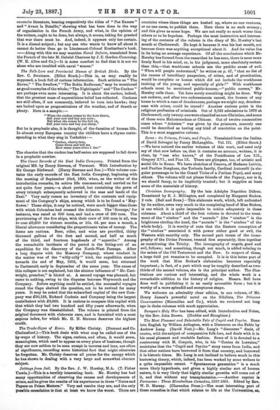The Court Records of the East India Company. Printed from
the original MS. by Henry Stevens, of Vermont. With Introduction by Sir George Birdwood. (Harry Stevens and Son.)—This volume con- tains the early records of the East India Company, beginning with the meeting of September 23rd, 1600, when, as the writer of the introduction remarks, its active life commenced, and oarried on for not quite four years,—a short period, but containing the germ of every triumph subsequently achieved in the seas and lands of the East." Very early comes an inventory of the contents and equip- ment of the Company's ships, among which ie to be found a May- flower.' These ships, it may be noticed, were much bigger than those with which Columbus had crossed the Atlantic. The Scourge,' for instance, was rated at 600 tons, and had a crew of 200 men. The provisioning of the five ships, with their crew of 600 men in all, was to cost £6,600 for sixteen months, or 16s. 6d. per man a month, a liberal allowance considering the proportionate value of money. The items are carious. Beer, cider, and wine are provided, thirty thousand gallons of the first and second, and half as much of the third, and fourteen hogsheads of " aqaavite." Among the remarkable incidents of the period is the fitting-out of an expedition for the discovery of the North-West Passage. After a long dispute with the Muscovy Company, whose conduct in the matter was of the " willy-nilly " kind, the expedition started towards the end of May, 1602, it would eeem, but returned to Dartmouth early in September of the same year. The cause of this collapse is not explained, but the sinister influence of " Mr. Cart- wright, preacher," is hinted at. A second voyage was planned, but came to nothing, owing to the disputes between Weymouth and the Company. Before anything could be settled, the successful voyages round the Cape shelved the question, not to be revived for many years. It may be noted that the anbscribed capital of the new Com- pany was £30,133, Richard Cockain and Company being the largest oontributore with £3,000. It is curious to compare this capital with that which they had two hundred and fifty years afterwards, when the Company was disestablished. The volume is printed from the original document with elaborate care, and is furnished with a most copious index, for which Mr. H. N. Stevens deserves the highest credit.


































 Previous page
Previous page